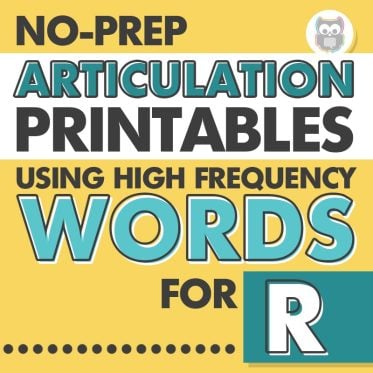The very nature of being an SLP makes setting priorities and staying on task particularly challenging.
In the school environment, an SLP’s day is segmented into 15, 30, or other relatively small segments of time spent in therapy. You might spend 15 minutes running articulation drills and practice for a small group and then find yourself spending 30 minutes tracking 10 language goals for your next small group. The next group might be group of wiggly preschoolers who need play-based therapy, followed by a 30 minute segment of curriculum-based therapy with 5th graders. Therapy can look completely different based on area of impairment, age of the child, and each child’s individualized goals.
And that’s just thinking about therapy!
The behind-the-scenes aspects of our jobs add in yet another layer. When you only have snatches of time in the day, you might find yourself writing detailed evaluation reports in 15 minute intervals. And of course, every time you sit down to start again, you have to spend at least a couple of minutes figuring out where you left off. Add in writing annual IEPs, checking and answering emails and phone calls from parents and school staff, billing, fielding referrals, and trying to stay knowledgeable about our careers and there are so many things we need to consider and manage daily.
I had fun with this in my If Your Give an SLP a Cookie post, but whew! Our jobs are a lot to handle!
Our average work day can be filled with so many starts and stops that it can be a struggle to keep up with the mental gear changes!
Enter Priorities
The reality of the situation is that we can’t do it all.
We have to prioritize.
When we set priorities, we have to look at what is most important and make sure to focus on those things.
Do Your Actions reflect your priorities?
Do your actions reflect your priorities?
Think about your last week at work, or even just the last day.
What took up the most time?
Was that the most important thing?
We might think that our #1 priority is one thing, but find ourselves spending too much time on something completely different.
Now obviously, we have job requirements that might interfere with our priority philosophy. For example, I think many SLPs will say that the #1 priority is to focus on our students. And it might feel like that’s impossible to do with an oversized caseload or tedious paperwork requirements.
That’s why it’s important to come up with efficient systems!
Do you feel like paperwork is in your way?
Don’t overthink it! You’re a qualified professional and you know what you’re doing, I promise! You are constantly learning and growing and your students are too. Perfectionism is unattainable and really, it’s just a form of procrastination.
DO use templates in highly repetitive paperwork tasks.
Good use of time: A thorough evaluation in formal and informal settings with the student, parents, and school staff.
Poor use of time: Rewriting that one paragraph in your report over the course of multiple days. Work on accepting what is good enough.
Watch out for avoidance behaviors
Is there something at work you are avoiding?
Maybe you need to write that report, but you just don’t want to get started yet. And so you find other Very Important Tasks to do.
Having visuals in speech therapy is vital. Printing and laminating cute therapy materials you’ll only use once is not.
Having a tidy and reasonably organized therapy space is important. Expensive and elaborate decorating is not.
Having an open line of dialogue and good working relationships with other staff is key. Just be mindful of the time you spend chatting.
Remember what is important and catch yourself when you are doing something that isn’t on that list.
And, if I say that some things are not important, does that mean that they shouldn’t be important to you? No! Just know that you can only physically have a limited number of priorities. When you say yes to one thing, you are saying no to something else.
Work priorities will spill over if you let them
Work priorities don’t just effect what happens at work. If you come up to a deadline and your reports aren’t written, you’ll probably work on them in the evening or on the weekend. Is your work more important than your home priorities? Maybe a few people out there feel like their work is their #1 priority, but I think most people need and want to make time for self care and friend and family relationships.
When we fail to prioritize at work, work takes over.
A game I like to play with myself is to try and list all of my top priorities at any given moment. And then I force myself to downsize it.
And minimize it again.
And then cut a couple more things out.
Over and over again until I get down to my TRUE priorities for right now.
Nobody shares the list of things they’re not doing but, at least for me, that list is always 10x as long as the things I’m able to get done.
But…
Don’t make setting priorities your top priority!
A really important skill is to be able to work on something, complete it, and walk away. If you’re constantly editing and rewriting your to-do list, you’re making writing to-do lists a priority!
Don’t let the tool take control.
Good luck setting priorities! Take charge of your life and achieve what is most important to you!





















Leave a Comment